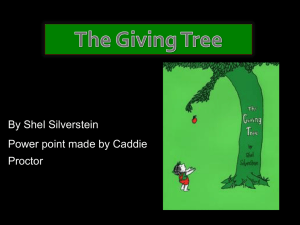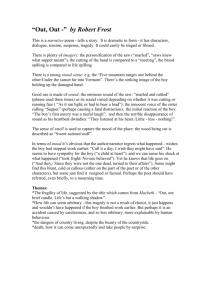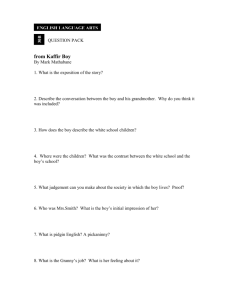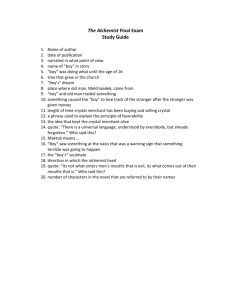we are compelled to tell a story - Pathways RTC
advertisement
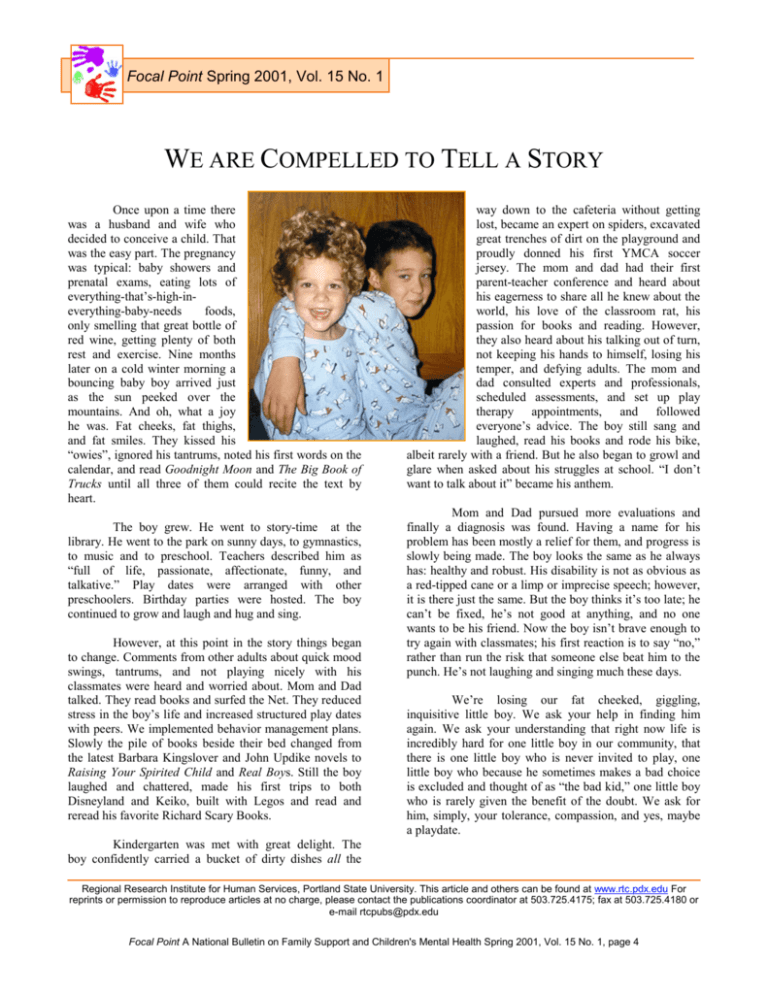
Focal Point Spring 2001, Vol. 15 No. 1 WE ARE COMPELLED TO TELL A STORY Once upon a time there was a husband and wife who decided to conceive a child. That was the easy part. The pregnancy was typical: baby showers and prenatal exams, eating lots of everything-that’s-high-ineverything-baby-needs foods, only smelling that great bottle of red wine, getting plenty of both rest and exercise. Nine months later on a cold winter morning a bouncing baby boy arrived just as the sun peeked over the mountains. And oh, what a joy he was. Fat cheeks, fat thighs, and fat smiles. They kissed his “owies”, ignored his tantrums, noted his first words on the calendar, and read Goodnight Moon and The Big Book of Trucks until all three of them could recite the text by heart. The boy grew. He went to story-time at the library. He went to the park on sunny days, to gymnastics, to music and to preschool. Teachers described him as “full of life, passionate, affectionate, funny, and talkative.” Play dates were arranged with other preschoolers. Birthday parties were hosted. The boy continued to grow and laugh and hug and sing. However, at this point in the story things began to change. Comments from other adults about quick mood swings, tantrums, and not playing nicely with his classmates were heard and worried about. Mom and Dad talked. They read books and surfed the Net. They reduced stress in the boy’s life and increased structured play dates with peers. We implemented behavior management plans. Slowly the pile of books beside their bed changed from the latest Barbara Kingslover and John Updike novels to Raising Your Spirited Child and Real Boys. Still the boy laughed and chattered, made his first trips to both Disneyland and Keiko, built with Legos and read and reread his favorite Richard Scary Books. way down to the cafeteria without getting lost, became an expert on spiders, excavated great trenches of dirt on the playground and proudly donned his first YMCA soccer jersey. The mom and dad had their first parent-teacher conference and heard about his eagerness to share all he knew about the world, his love of the classroom rat, his passion for books and reading. However, they also heard about his talking out of turn, not keeping his hands to himself, losing his temper, and defying adults. The mom and dad consulted experts and professionals, scheduled assessments, and set up play therapy appointments, and followed everyone’s advice. The boy still sang and laughed, read his books and rode his bike, albeit rarely with a friend. But he also began to growl and glare when asked about his struggles at school. “I don’t want to talk about it” became his anthem. Mom and Dad pursued more evaluations and finally a diagnosis was found. Having a name for his problem has been mostly a relief for them, and progress is slowly being made. The boy looks the same as he always has: healthy and robust. His disability is not as obvious as a red-tipped cane or a limp or imprecise speech; however, it is there just the same. But the boy thinks it’s too late; he can’t be fixed, he’s not good at anything, and no one wants to be his friend. Now the boy isn’t brave enough to try again with classmates; his first reaction is to say “no,” rather than run the risk that someone else beat him to the punch. He’s not laughing and singing much these days. We’re losing our fat cheeked, giggling, inquisitive little boy. We ask your help in finding him again. We ask your understanding that right now life is incredibly hard for one little boy in our community, that there is one little boy who is never invited to play, one little boy who because he sometimes makes a bad choice is excluded and thought of as “the bad kid,” one little boy who is rarely given the benefit of the doubt. We ask for him, simply, your tolerance, compassion, and yes, maybe a playdate. Kindergarten was met with great delight. The boy confidently carried a bucket of dirty dishes all the Regional Research Institute for Human Services, Portland State University. This article and others can be found at www.rtc.pdx.edu For reprints or permission to reproduce articles at no charge, please contact the publications coordinator at 503.725.4175; fax at 503.725.4180 or e-mail rtcpubs@pdx.edu Focal Point A National Bulletin on Family Support and Children's Mental Health Spring 2001, Vol. 15 No. 1, page 4 Joyce Van Anne Ashland, Oregon, is a mother and Special Educator. Regional Research Institute for Human Services, Portland State University. This article and others can be found at www.rtc.pdx.edu For reprints or permission to reproduce articles at no charge, please contact the publications coordinator at 503.725.4175; fax at 503.725.4180 or e-mail rtcpubs@pdx.edu Focal Point A National Bulletin on Family Support and Children's Mental Health Spring 2001, Vol. 15 No. 1, page 4

